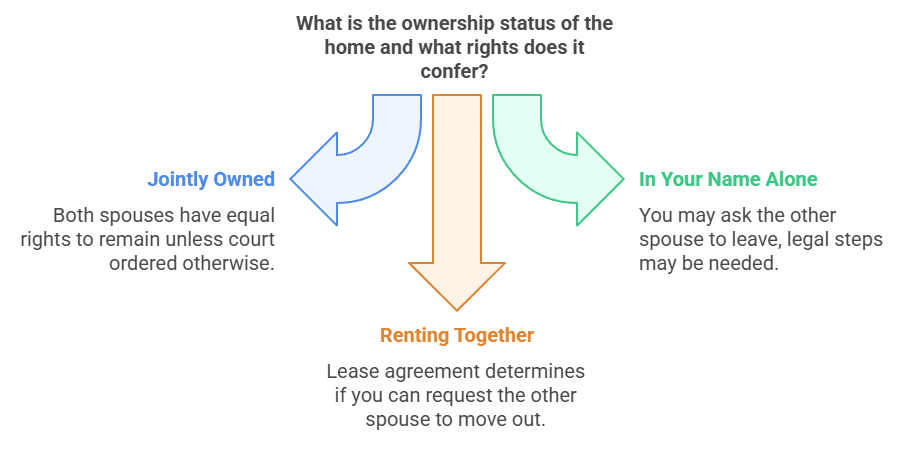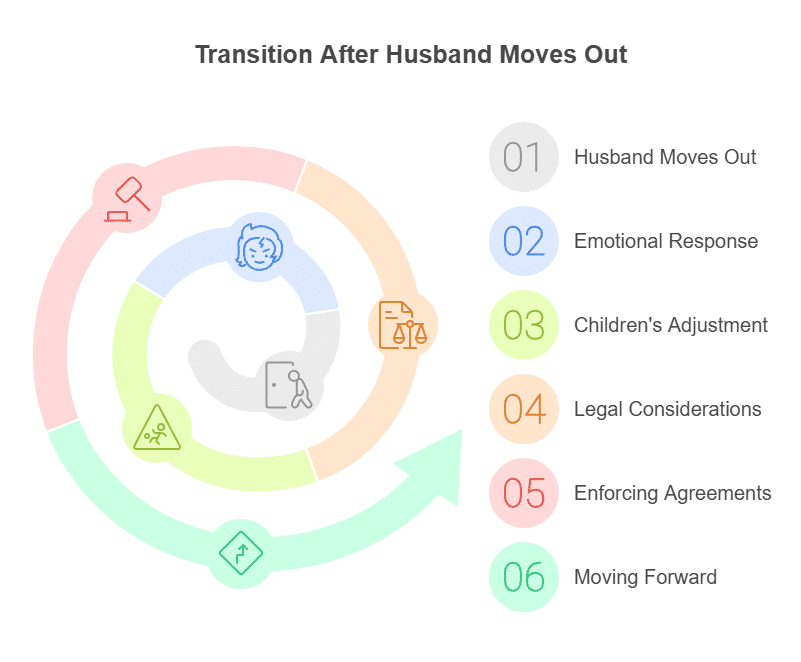How to Legally and Safely Get Your Husband to Leave the House: Your Rights, Options, and Next Steps
Facing the reality of divorce or separation is never easy, and when your husband refuses to leave the house, the situation becomes even more stressful. Whether the home is jointly owned or under one spouse’s name, knowing your legal rights and options is crucial.

At the Law Office of Nida Din PLLC, we understand the complexities of marital property, legal eviction, and safety concerns. If you’re wondering what steps you can take to remove your husband from the home legally and safely, this guide will walk you through your options, including divorce mediation, court orders, and protective measures.
Let’s explore how you can handle this situation effectively.
Understanding Your Legal Rights
If you’re feeling trapped because your husband refuses to leave, you’re not alone. Many people in this situation feel frustrated, overwhelmed, and unsure of what steps to take next. You might be wondering, “Do I even have the right to ask him to leave?” or “What if he refuses—am I stuck?”
The good news is that you do have options. Whether your name is on the house or not, Texas law provides ways to resolve this situation fairly—whether through mediation, court orders, or, in some cases, protective measures.
The key is to understand what the law says about your home, your rights, and what steps you can take to move forward safely. Let’s break it down so you can approach this with confidence.
Marital Property Laws in Texas
In Texas, property laws are based on community property, meaning that assets acquired during the marriage—including a home—are generally considered jointly owned. However, if the home was purchased before the marriage or is in one spouse’s name, the situation may be different.
- If the home is jointly owned, both spouses have equal rights to remain in it unless a court order states otherwise.
- If the home is in your name alone, you may have the right to ask him to leave, but legal steps may still be necessary.
- If you are renting together, the lease agreement will determine whether you can request that he move out.
Can You Legally Force Your Husband to Leave?
A spouse cannot simply be “kicked out” of the home without legal grounds. However, you can request a temporary court order during a divorce to grant you exclusive use of the home. A judge may approve this request if staying in the same home creates conflict or hardship.
Does Separation Require One Spouse to Leave?
Unlike some states, Texas does not have formal legal separation laws. That means unless a court order dictates otherwise, both spouses technically have the right to remain in the home until the divorce is finalized.
Non-Legal Strategies: Encouraging Him to Leave Voluntarily
If you’re in this situation, you’ve probably already had more than a few exhausting conversations with your husband about moving out—only to hit a wall each time. Maybe he refuses to leave out of stubbornness, financial concerns, or even just to make things more difficult for you. Whatever the reason, being stuck under the same roof when you’re trying to move on can feel unbearable.
The good news? There are ways to approach this that don’t immediately involve courts or legal action. While not every spouse will be willing to cooperate, communication, mediation, and negotiation can sometimes make a difference. The goal here is to create a plan that works for both of you—or at the very least, encourages him to leave without escalating conflict.
Let’s explore some practical, step-by-step approaches to getting him to agree to move out voluntarily.
Open Communication
Approach the conversation calmly and clearly. Discuss why separating living arrangements is necessary and explore temporary housing options for him.
Mediation as an Alternative to Court Action
If direct discussions fail, consider divorce mediation. A neutral mediator can help both parties negotiate living arrangements, including who stays in the home and who moves out. Mediation can be a court-free divorce solution that avoids unnecessary legal battles.
Negotiating an Exit Plan
If he is unwilling to leave, offering incentives might help. For example, you could:
- Agree on a timeline for his departure.
- Offer to cover moving expenses or temporary rent.
- Work out financial terms through divorce negotiation.
Mediation allows for flexible divorce agreements where both parties have a say in the outcome.
Legal Options to Remove a Spouse Who Refuses to Leave
Sometimes, no matter how reasonable you try to be, your husband just won’t budge. Maybe he’s hoping to stall the divorce, maybe he’s refusing to acknowledge the reality of the situation, or maybe he just doesn’t want to leave out of spite. Whatever the reason, you’re feeling stuck, frustrated, and possibly even unsafe.
If conversations and mediation haven’t worked, it may be time to explore legal options to resolve this situation. While you can’t simply “kick him out” without legal grounds, there are clear steps you can take—such as filing for temporary orders, requesting exclusive use of the home, or even pursuing a protective order if your safety is at risk.
Let’s go over your legal rights and the specific actions you can take to remove your husband from the home legally and safely.
Filing for Divorce and Requesting a Temporary Order
Once a divorce is filed, you can request a temporary order for exclusive use of the home. The court considers factors like:
- Who primarily pays for the home?
- Are there children involved?
- Is staying together creating a hostile or unsafe environment?
If granted, your husband will be required by law to leave.
Protective Orders (If Abuse or Threats Are Involved)
If your husband is abusive or threatening, you can request a restraining order or a protective order. This legal measure can remove him from the home immediately and prevent him from returning.
Eviction Laws: Can You Legally Evict Your Spouse?
If your husband refuses to leave, you might wonder if he can be evicted like a tenant. Generally, eviction laws do not apply to spouses, but if he is no longer contributing to the home and the marriage has ended, a judge may grant an order requiring him to vacate.
What If Your Husband Owns the Home?
If your name is not on the house deed, your rights depend on whether you contributed financially or have marital interest in the home. In many cases, you can request temporary residency during the divorce.
Practical Steps to Take Before Pursuing Legal Action
Before you take the legal route, it’s important to be as prepared as possible. If your husband refuses to leave, jumping straight into legal action without gathering the right information could lead to unnecessary delays or complications.
Think of this stage as laying the groundwork for a smoother process. Whether you end up pursuing divorce mediation, requesting a temporary court order, or filing for a protective order, having the right documents and support in place can make all the difference.
This is especially important if you’re dealing with financial concerns, property disputes, or safety risks. Taking these steps now will help protect you legally, emotionally, and financially as you move forward. Let’s go over what you should do before making any legal moves.
Gathering Documentation
Having the right documents can strengthen your case:
- Proof of homeownership (deed, mortgage statements)
- Financial records showing contributions to housing costs
- Any history of abuse or threats, if applicable
Consulting a Divorce Attorney
A legal consultation can clarify your rights and help determine whether to pursue mediation, a temporary order, or a protective order. Nida Din specializes in family law and can guide you through this process.
Safety Considerations
If your situation involves domestic violence, your safety is the top priority. In such cases:
- Contact a local shelter or support group.
- Seek legal protection before confronting your husband about leaving.
- Call law enforcement if needed.
What to Expect After Your Husband Leaves
After all the stress and uncertainty, the day finally comes—your husband moves out. You might feel a huge sense of relief, but at the same time, a wave of new emotions and questions can hit you. What happens next? How do you handle this transition? What if he tries to come back?
This period can be a mix of emotions—freedom, sadness, anxiety, or even guilt. If you have children, their adjustment will be a big part of this process too. On the legal side, you may still need to address divorce proceedings, financial changes, and enforcement of any agreements.
Whether your husband left voluntarily or was ordered by the court to leave, the next steps are about moving forward. Let’s go over what to expect in the days and weeks after he’s gone, how to enforce court orders if necessary, and what options you have if the living arrangements need to be modified later.
Handling the Transition Period
This period can be emotionally difficult, especially if children are involved. Consider:
- Establishing clear boundaries for future communication.
- Adjusting to financial changes.
- Seeking emotional support from friends, family, or a therapist.
Enforcing a Court Order (If Necessary)
If a judge grants an order requiring your husband to leave and he refuses, law enforcement can intervene. Failure to comply with a court order can result in legal penalties.
Modifying Living Arrangements in the Future
If your husband left the home voluntarily, he may later request post-divorce mediation to discuss living arrangements. Mediation can help modify agreements based on changes in financial or personal circumstances.
Final Thoughts: Get the Right Legal Guidance
Deciding how to remove a spouse from the home is a complex issue that requires careful consideration of legal rights, personal safety, and long-term consequences. Whether through divorce mediation, a court order, or legal separation mediation, there are options available.
If you’re unsure about the best approach, consulting a skilled attorney can provide clarity. The Law Office of Nida Din PLLC is here to help. With extensive experience in family law, divorce mediation, and protective orders, Nida Din can guide you through the legal process while prioritizing your safety and financial interests.
???? Contact the Law Office of Nida Din PLLC today for a confidential consultation and take the first step toward securing your future.


